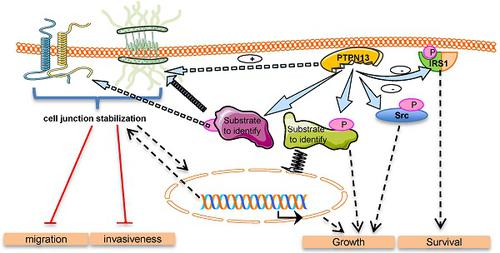Theranostics ( IF 12.4 ) Pub Date : 2020-01-01 , DOI: 10.7150/thno.38537 Mohamed Hamyeh 1 , Florence Bernex 1, 2 , Romain M Larive 1 , Aurélien Naldi 3 , Serge Urbach 4 , Joelle Simony-Lafontaine 1, 2 , Carole Puech 1 , William Bakhache 1 , Jérome Solassol 1, 5 , Peter J Coopman 1 , Wiljan J A J Hendriks 6 , Gilles Freiss 1

|
Clinical data suggest that the protein tyrosine phosphatase PTPN13 exerts an anti-oncogenic effect. Its exact role in tumorigenesis remains, however, unclear due to its negative impact on FAS receptor-induced apoptosis.
Methods: We crossed transgenic mice deleted for PTPN13 phosphatase activity with mice that overexpress human HER2 to assess the exact role of PTPN13 in tumor development and aggressiveness. To determine the molecular mechanism underlying the PTPN13 tumor suppressor activity we developed isogenic clones of the aggressive human breast cancer cell line MDA-MB-231 overexpressing either wild type or a catalytically-inactive mutant PTPN13 and subjected these to phosphoproteomic and gene ontology analyses.
We investigated the PTPN13 consequences on cell aggressiveness using wound healing and Boyden chamber assays, on intercellular adhesion using videomicroscopy, cell aggregation assay and immunofluorescence.
Results: The development, growth and invasiveness of breast tumors were strongly increased by deletion of the PTPN13 phosphatase activity in transgenic mice. We observed that PTPN13 phosphatase activity is required to inhibit cell motility and invasion in the MDA-MB-231 cell line overexpressing PTPN13. In vivo, the negative PTPN13 effect on tumor invasiveness was associated with a mesenchymal-to-epithelial transition phenotype in athymic mice xenografted with PTPN13-overexpressing MDA-MB-231 cells, as well as in HER2-overexpressing mice with wild type PTPN13, compared to HER2-overexpressing mice that lack PTPN13 phosphatase activity. Phosphoproteomic and gene ontology analyses indicated a role of PTPN13 in the regulation of intercellular junction-related proteins. Finally, protein localization studies in MDA-MB-231 cells and HER2-overexpressing mice tumors confirmed that PTPN13 stabilizes intercellular adhesion and promotes desmosome formation.
Conclusions: These data provide the first evidence for the negative role of PTPN13 in breast tumor invasiveness and highlight its involvement in cell junction stabilization.
中文翻译:

PTPN13诱导细胞连接稳定并抑制乳腺肿瘤的侵袭性。
临床数据表明,蛋白质酪氨酸磷酸酶PTPN13具有抗癌作用。然而,由于其对FAS受体诱导的细胞凋亡的负面影响,其在肿瘤发生中的确切作用仍不清楚。
方法:我们将缺失PTPN13磷酸酶活性的转基因小鼠与过量表达人HER2的小鼠杂交,以评估PTPN13在肿瘤发展和侵袭性中的确切作用。为了确定潜在的PTPN13肿瘤抑制活性的分子机制,我们开发了过度表达野生型或无催化活性的突变体PTPN13的侵略性人乳腺癌细胞系MDA-MB-231的同基因克隆,并对其进行了磷酸化蛋白质组学和基因本体分析。
我们研究了PTPN13对伤口愈合和博伊登室测定法对细胞侵袭性的影响,对使用视频显微镜,细胞聚集测定法和免疫荧光法对细胞间粘附的影响。
结果:通过删除转基因小鼠中的PTPN13磷酸酶活性,乳腺肿瘤的生长,生长和侵袭性得到了极大的增强。我们观察到,需要PTPN13磷酸酶活性来抑制细胞运动和过度表达PTPN13的MDA-MB-231细胞系中的侵袭。体内与HER2相比,PTPN13对肿瘤侵袭性的负面影响与异种移植了PTPN13的MDA-MB-231细胞异种移植的无胸腺小鼠以及野生型PTPN13的HER2过表达的小鼠之间的间充质上皮转化表型有关。 -缺乏PTPN13磷酸酶活性的过表达小鼠。磷酸化蛋白质组学和基因本体论分析表明PTPN13在调控细胞间连接相关蛋白中的作用。最后,在MDA-MB-231细胞和过表达HER2的小鼠肿瘤中的蛋白质定位研究证实了PTPN13稳定了细胞间的粘附并促进了桥粒的形成。
结论:这些数据为PTPN13在乳腺肿瘤浸润中的负作用提供了第一个证据,并突显了其在细胞连接稳定中的作用。











































 京公网安备 11010802027423号
京公网安备 11010802027423号